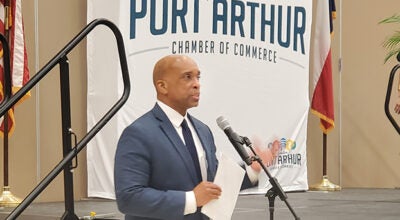Transport times sticking point for council
Published 4:23 pm Tuesday, October 23, 2018
Fire chief to weigh
response standards
By Ken Stickney
The Port Arthur City Council on Tuesday seemed inclined to stick with the city’s current, sole ambulance service provider, although council members sought answers about reported poor response times on transport calls.
Viking Enterprises, doing business as City Ambulance, had sought City Council approval to enter the ambulance business here last month. The Houston area company transports patients, but does not do 911 emergency calls.
Port Arthur Fire Chief Larry Richard, who has oversight of ambulance services in this city, suggested last month that City Ambulance be denied a city permit because the company did not show proof it had malpractice insurance, which is required for an ambulance service under Port Arthur’s ordinance.
Some City Council members said then that the city might consider City Ambulance’s permit application because they believe in free enterprise. Richard said that if City Ambulance were granted a permit, it would have to share in 911 emergency services, which the company has not previously done. City Ambulance deals primarily in transporting patients for non-emergencies, but said it was willing to provide 911 services.
At a City Council workshop Tuesday, District 4 City Councilman Harold Doucet said he would not be comfortable with City Ambulance cutting its teeth on emergency 911 services in Port Arthur.
Richard told council members that Acadian Ambulance, the sole 911 provider for the city, has operated alone here since 2008. In the decade prior to that, Port Arthur had two and sometimes three companies working with city permits to provide ambulance service, but there was a constant flux among providers that included mergers and sales and one company leaving “in the dead of night.”
He said that Acadian provides 911 service here at no cost to the city. It offsets its own costs because it has exclusive service for the more lucrative transport calls, which include bringing patients from hospital to hospital or home.
By comparison, he said, the city of Beaumont provides its own 911 service, but at a cost to taxpayers of more than $2 million annually.
Still, Doucet, and District 3 Councilman Thomas Kinlaw expressed concerns about citizen complaints, mostly on the matter of timely service for transport patients.
“We have a senior population with a lot of transports,” Doucet said. “People are talking about the transport time.”
“To hear people have to wait to be transferred breaks my heart,” said District 7 Councilwoman Charlotte Moses.
Richard noted that the city ordinance does not provide specific requirements for transport service, and suggested that he would study that issue and check with national standards for providing transfers.
But he seemed reluctant to bring in more private ambulance companies — “not if it keeps companies from being viable.”
Some council members also expressed some skepticism that the private company does its own self reporting to the Fire Department on its response times. Brandon Hebert of Acadian Ambulance said that those reported times are backed up by dispatch data, in that the dispatchers send them to scenes and the company reports back to dispatch when they arrive there.
Doucet told Hebert, “The council doesn’t have a problem with your service. We can only relay back to you what citizens tell us.”
Hebert said after the meeting that Acadian would be “receptive” to reporting its transfer times, if the council wants them to do that.
He said that having a single 911 service provider, though, avoids problems related to duplication of services and “ensures ambulances get quickly to emergencies.”





